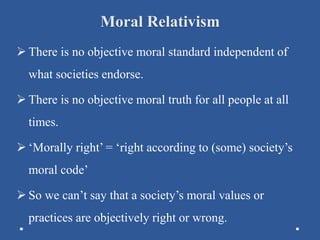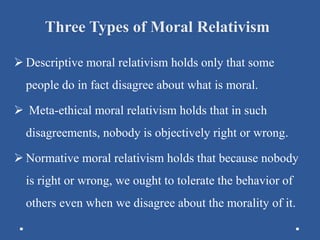Explain the Difference Between an Objective Morality and Moral Relativism
Absolute morality is the belief that there are standards of behaviours from which deeds are measured. Explain the difference between subjective ethical relativism and conventionalism.

What Is The Difference Between Kantianism And Utilitarianism Pediaa Com Philosophy Theories Moral Philosophy Teaching Literature
On the other hand moral objectivism views that.

. Moral relativism claims that what is good or evil can vary from situation to situation and from one personal opinion to another. Moral relativism is a philosophical doctrine which claims that moral or ethical theses do not reveal unqualified and complete moral truths Pojman 1998. However it formulates claims comparative to social historical and cultural or individual preferences.
Morality in a sense is difficult to explain both theories attempt to shed a bit of light in way to break down its complexity. The theories discussed will be ethical relativism and ethical objectivism. Ethical objectivism which claims that some moral rules really are correct.
Objective morality believes that morality is fundamentally rooted in you from the beginning of time whereas subjective morality can vary from situation to situation. The Difference Between Descriptive And Moral Relativism. Those morals that lead toward being the archetypal perfect person.
Moral RelativismThe view that what is morally right or wrongdepends on what someone thinks. Explain the difference between subjective ethical relativism and conventionalism. This week I have a twofold question.
In a sense it is up to the people to determine what is right and wrong. Moral Relativism and Objectivism. 1 Is there any value you think should be understood by everyone as an objective right or wrong that is something not just right and wrong as a matter of individual or cultural opinion.
If you believe some moral truths are relative and some are objective then you are NOT a cultural relativist because you believe there is an objective way to judge in some cases. Cultural relativism is the position that all moral beliefs are relative because morality is simply cultural approval and there is no transcultural objective way to judge cultures. We all know people do in fact disagree about morality a great.
Table 1 reflects the availability of fine-grained distinctions between different forms of relativism as functions of both objects x and domains y of relativizationIn practice however much contemporary discussions of relativism focus on subjectivism historicism cultural relativism and conceptual relativism along the axis of y and cognitiveepistemic. To which the claim that opinions varysubstantially about right and wrong is usually added We can think ofthis position as coming in two flavours. Ethical relativism is defined as having no absolute stance on a position.
Ethical objectivism has an aspect of universality of moral values whereas ethical relativism confines moral values to the individual and the society. In a sense it is up to the people to determine what is right and wrong. Moral relativism denotes that the moral judgments are based on the context with emphasis on religion culture and even philosophy.
Moral Relativism argues in the view that morality exists only due to the fact that it is relative or in respect to cultural or individual beliefs. Explain the differences between moral relativism cultural relativism and individual relativism. The difference between individual and cultural relativism is based on ethical values where cultural relativism holds the values that vary from society to society and that the basis for moral judgments lies in theses social cultural views.
Relativism and subjectivism are two views that concern. The key difference between relativism and subjectivism is that relativism is the claim that knowledge truth and morality exist in relation to culture or society and that there are no universal truths while subjectivism is the claim that knowledge is merely subjective and that there is no external or objective truth. There are two different theories dealing with morality what is right or wrong and what is good or bad.
There is no right or wrong. Moral Relativism vs. The objective or natural law is rooted in the fundamental dignity of the human person and the sacredness of human life.
Morality in a sense is difficult to explain both theories attempt to shed a bit of light in way to break down its complexity. On the contrary moral objectivism also known as moral absolutism encompasses ethical theories that. Moral relativism is the view that ethical standards morality and positions of right or wrong are culturally based and therefore subject to a persons individual choice.
Name several social and political issues today that pertain to the moral law. Once again moral relativism stresses that there is no such thing as universal morality. Sometimes people argue that since there are no universal moral truths each cultures morality is as good as every other so we ought not to interfere in its practices.
Objective morals hold true universally such as that which helps a person climb or subsist within a hierarchy. When it comes to justifying moral relativism there is no decision procedure that can demonstrate the objective truth or falsity of moral judgments. Wading into a conversation on morality is a touchy thing but diving into a lesson on moral relativism subjectivism and objectivism is downright daunting.
The doctrine of ethical relativism asserts that moral principles are relative to individuals and the society. Moral Relativism and Objectivism. The difference between the two is whether a moral supportscorrects a persons natural animal behavior or if the moral is a pure generation of the rational mind.
Explain the difference between objective morality and moral relativism. Sometimes people argue that since there are no universal moral truths each cultures morality is as good as every other so we ought not to interfere in its practices. Moral Relativism argues in the view that morality exists only due to the fact that it is relative or in respect to cultural or individual beliefs.
This denial of universality allows researchers to seek the unique function of each moral belief. These concern the extent to which there is moral disagreement or moral diversity among people that is DMR the extent to which folk morality is committed to an objectivist or relativist understanding of moral judgments that is the views of ordinary people concerning MMR and the extent to which acceptance of moral relativism affects moral attitudes such as.
Objective Morality Definition Aulad Org

Are Moral Values And Duties Objective An Examination On Whether Morality Is Purely Subjective Or Objective Ppt Download

True Freedom Can Never Exist In A Society That Embraces Moral Relativism The Idea That There Is No Inherent Knowledge And Wisdom Laws Of Life Psychology Facts

Phl 105 Nihilism Relativism Objectivism Subjectivism 3

Phl 105 Nihilism Relativism Objectivism Subjectivism 3

4 10 Does God Exist The Moral Argument Objective Realities Objective Realities Objective Definition Objective Definition Expressing Or Dealing Ppt Download

In Defense Of Absolute Truth Relative Vs Absolute Truth Ppt Download

Atheist Accidentally Affirms Objective Morality While Denying It

No comments for "Explain the Difference Between an Objective Morality and Moral Relativism"
Post a Comment